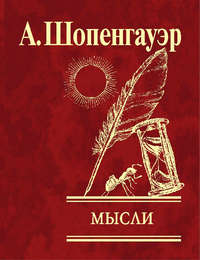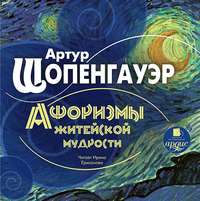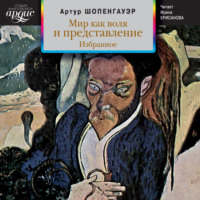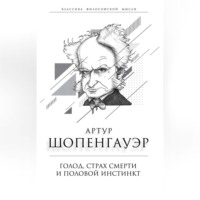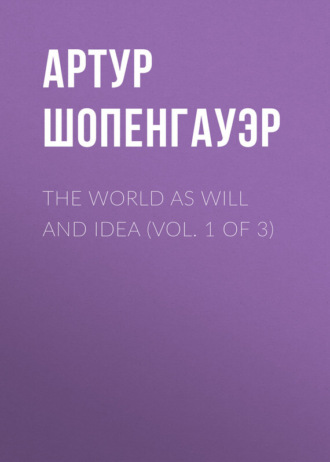 полная версия
полная версияThe World as Will and Idea (Vol. 1 of 3)
If by this exposition the difference between a force of nature and all its phenomena has been made quite distinct; if we have seen clearly that the former is the will itself at this particular grade of its objectification, but that multiplicity comes to phenomena only through time and space, and that the law of causality is nothing but the determination of the position of these phenomena in time and space; then we shall recognise the complete truth and the deep meaning of Malebranche's doctrine of occasional causes (causes occasionelles). It is well worth while comparing this doctrine of his, as he explains it in the “Recherches de la Vérite,” both in the 3rd Chapter of the second part of the 6th Book, and in the éclaircissements appended to this chapter, with this exposition of mine, and observing the complete agreement of the two doctrines in the case of such different systems of thought. Indeed I cannot help admiring how Malebranche, though thoroughly involved in the positive dogmas which his age inevitably forced upon him, yet, in such bonds and under such a burden, hit the truth so happily, so correctly, and even knew how to combine it with these dogmas, at all events verbally.
For the power of truth is incredibly great and of unspeakable endurance. We find constant traces of it in all, even the most eccentric and absurd dogmas, of different times and different lands, – often indeed in strange company, curiously mixed up with other things, but still recognisable. It is like a plant that germinates under a heap of great stones, but still struggles up to the light, working itself through with many deviations and windings, disfigured, worn out, stunted in its growth, – but yet, to the light.
In any case Malebranche is right: every natural cause is only an occasional cause. It only gives opportunity or occasion for the manifestation of the one indivisible will which is the “in-itself” of all things, and whose graduated objectification is the whole visible world. Only the appearance, the becoming visible, in this place, at this time, is brought about by the cause and is so far dependent on it, but not the whole of the phenomenon, nor its inner nature. This is the will itself, to which the principle of sufficient reason has not application, and which is therefore groundless. Nothing in the world has a sufficient cause of its existence generally, but only a cause of existence just here and just now. That a stone exhibits now gravity, now rigidity, now electricity, now chemical qualities, depends upon causes, upon impressions upon it from without, and is to be explained from these. But these qualities themselves, and thus the whole inner nature of the stone which consists in them, and therefore manifests itself in all the ways referred to; thus, in general, that the stone is such as it is, that it exists generally – all this, I say, has no ground, but is the visible appearance of the groundless will. Every cause is thus an occasional cause. We have found it to be so in nature, which is without knowledge, and it is also precisely the same when motives and not causes or stimuli determine the point at which the phenomena are to appear, that is to say, in the actions of animals and human beings. For in both cases it is one and the same will which appears; very different in the grades of its manifestation, multiplied in the phenomena of these grades, and, in respect of these, subordinated to the principle of sufficient reason, but in itself free from all this. Motives do not determine the character of man, but only the phenomena of his character, that is, his actions; the outward fashion of his life, not its inner meaning and content. These proceed from the character which is the immediate manifestation of the will, and is therefore groundless. That one man is bad and another good, does not depend upon motives or outward influences, such as teaching and preaching, and is in this sense quite inexplicable. But whether a bad man shows his badness in petty acts of injustice, cowardly tricks, and low knavery which he practises in the narrow sphere of his circumstances, or whether as a conqueror he oppresses nations, throws a world into lamentation, and sheds the blood of millions; this is the outward form of his manifestation, that which is unessential to it, and depends upon the circumstances in which fate has placed him, upon his surroundings, upon external influences, upon motives; but his decision upon these motives can never be explained from them; it proceeds from the will, of which this man is a manifestation. Of this we shall speak in the Fourth Book. The manner in which the character discloses its qualities is quite analogous to the way in which those of every material body in unconscious nature are disclosed. Water remains water with its intrinsic qualities, whether as a still lake it reflects its banks, or leaps in foam from the cliffs, or, artificially confined, spouts in a long jet into the air. All that depends upon external causes; the one form is as natural to it as the other, but it will always show the same form in the same circumstances; it is equally ready for any, but in every case true to its character, and at all times revealing this alone. So will every human character under all circumstances reveal itself, but the phenomena which proceed from it will always be in accordance with the circumstances.
§ 27. If, from the foregoing consideration of the forces of nature and their phenomena, we have come to see clearly how far an explanation from causes can go, and where it must stop if it is not to degenerate into the vain attempt to reduce the content of all phenomena to their mere form, in which case there would ultimately remain nothing but form, we shall be able to settle in general terms what is to be demanded of etiology as a whole. It must seek out the causes of all phenomena in nature, i. e., the circumstances under which they invariably appear. Then it must refer the multitude of phenomena which have various forms in various circumstances to what is active in every phenomenon, and is presupposed in the cause, – original forces of nature. It must correctly distinguish between a difference of the phenomenon which arises from a difference of the force, and one which results merely from a difference of the circumstances under which the force expresses itself; and with equal care it must guard against taking the expressions of one and the same force under different circumstances for the manifestations of different forces, and conversely against taking for manifestations of one and the same force what originally belongs to different forces. Now this is the direct work of the faculty of judgment, and that is why so few men are capable of increasing our insight in physics, while all are able to enlarge experience. Indolence and ignorance make us disposed to appeal too soon to original forces. This is exemplified with an exaggeration that savours of irony in the entities and quidities of the schoolmen. Nothing is further from my desire than to favour their resuscitation. We have just as little right to appeal to the objectification of will, instead of giving a physical explanation, as we have to appeal to the creative power of God. For physics demands causes, and the will is never a cause. Its whole relation to the phenomenon is not in accordance with the principle of sufficient reason. But that which in itself is the will exists in another aspect as idea; that is to say, is phenomenon. As such, it obeys the laws which constitute the form of the phenomenon. Every movement, for example, although it is always a manifestation of will, must yet have a cause from which it is to be explained in relation to a particular time and space; that is, not in general in its inner nature, but as a particular phenomenon. In the case of the stone, this is a mechanical cause; in that of the movement of a man, it is a motive; but in no case can it be wanting. On the other hand, the universal common nature of all phenomena of one particular kind, that which must be presupposed if the explanation from causes is to have any sense and meaning, is the general force of nature, which, in physics, must remain a qualitas occulta, because with it the etiological explanation ends and the metaphysical begins. But the chain of causes and effects is never broken by an original force to which it has been necessary to appeal. It does not run back to such a force as if it were its first link, but the nearest link, as well as the remotest, presupposes the original force, and could otherwise explain nothing. A series of causes and effects may be the manifestation of the most different kinds of forces, whose successive visible appearances are conducted through it, as I have illustrated above by the example of a metal machine. But the difference of these original forces, which cannot be referred to each other, by no means breaks the unity of that chain of causes, and the connection between all its links. The etiology and the philosophy of nature never do violence to each other, but go hand in hand, regarding the same object from different points of view. Etiology gives an account of the causes which necessarily produce the particular phenomenon to be explained. It exhibits, as the foundation of all its explanations, the universal forces which are active in all these causes and effects. It accurately defines, enumerates, and distinguishes these forces, and then indicates all the different effects in which each force appears, regulated by the difference of the circumstances, always in accordance with its own peculiar character, which it discloses in obedience to an invariable rule, called a law of nature. When all this has been thoroughly accomplished by physics in every particular, it will be complete, and its work will be done. There will then remain no unknown force in unorganised nature, nor any effect, which has not been proved to be the manifestation of one of these forces under definite circumstances, in accordance with a law of nature. Yet a law of nature remains merely the observed rule according to which nature invariably proceeds whenever certain definite circumstances occur. Therefore a law of nature may be defined as a fact expressed generally —un fait généralisé– and thus a complete enumeration of all the laws of nature would only be a complete register of facts. The consideration of nature as a whole is thus completed in morphology, which enumerates, compares, and arranges all the enduring forms of organised nature. Of the causes of the appearance of the individual creature it has little to say, for in all cases this is procreation (the theory of which is a separate matter), and in rare cases the generatio æquivoca. But to this last belongs, strictly speaking, the manner in which all the lower grades of the objectification of will, that is to say, physical and chemical phenomena, appear as individual, and it is precisely the task of etiology to point out the conditions of this appearance. Philosophy, on the other hand, concerns itself only with the universal, in nature as everywhere else. The original forces themselves are here its object, and it recognises in them the different grades of the objectivity of will, which is the inner nature, the “in-itself” of this world; and when it regards the world apart from will, it explains it as merely the idea of the subject. But if etiology, instead of preparing the way for philosophy, and supplying its doctrines with practical application by means of instances, supposes that its aim is rather to deny the existence of all original forces, except perhaps one, the most general, for example, impenetrability, which it imagines it thoroughly understands, and consequently seeks forcibly to refer all the others to it – it forsakes its own province and can only give us error instead of truth. The content of nature is supplanted by its form, everything is ascribed to the circumstances which work from without, and nothing to the inner nature of the thing. Now if it were possible to succeed by this method, a problem in arithmetic would ultimately, as we have already remarked, solve the riddle of the universe. But this is the method adopted by those, referred to above, who think that all physiological effects ought to be reduced to form and combination, this, perhaps, to electricity, and this again to chemism, and chemism to mechanism. The mistake of Descartes, for example, and of all the Atomists, was of this last description. They referred the movements of the globe to the impact of a fluid, and the qualities of matter to the connection and form of the atoms, and hence they laboured to explain all the phenomena of nature as merely manifestations of impenetrability and cohesion. Although this has been given up, precisely the same error is committed in our own day by the electrical, chemical, and mechanical physiologists, who obstinately attempt to explain the whole of life and all the functions of the organism from “form and combination.” In Meckel's “Archiv für Physiologie” (1820, vol. v. p. 185) we still find it stated that the aim of physiological explanation is the reduction of organic life to the universal forces with which physics deals. Lamarck also, in his “Philosophie Zoologique,” explains life as merely the effect of warmth and electricity: le calorique et la matière électrique suffisent parfaitement pour composer ensemble cette cause essentielle de la vie (p. 16). According to this, warmth and electricity would be the “thing-in-itself,” and the world of animals and plants its phenomenal appearance. The absurdity of this opinion becomes glaringly apparent at the 306th and following pages of that work. It is well known that all these opinions, that have been so often refuted, have reappeared quite recently with renewed confidence. If we carefully examine the foundation of these views, we shall find that they ultimately involve the presupposition that the organism is merely an aggregate of phenomena of physical, chemical, and mechanical forces, which have come together here by chance, and produced the organism as a freak of nature without further significance. The organism of an animal or of a human being would therefore be, if considered philosophically, not the exhibition of a special Idea, that is, not itself immediate objectivity of the will at a definite higher grade, but in it would appear only those Ideas which objectify the will in electricity, in chemism, and in mechanism. Thus the organism would be as fortuitously constructed by the concurrence of these forces as the forms of men and beasts in clouds and stalactites, and would therefore in itself be no more interesting than they are. However, we shall see immediately how far the application of physical and chemical modes of explanation to the organism may yet, within certain limits, be allowable and useful; for I shall explain that the vital force certainly avails itself of and uses the forces of unorganised nature; yet these forces no more constitute the vital force than a hammer and anvil make a blacksmith. Therefore even the most simple example of plant life can never be explained from these forces by any theory of capillary attraction and endosmose, much less animal life. The following observations will prepare the way for this somewhat difficult discussion.
It follows from all that has been said that it is certainly an error on the part of natural science to seek to refer the higher grades of the objectification of will to the lower; for the failure to recognise, or the denial of, original and self-existing forces of nature is just as wrong as the groundless assumption of special forces when what occurs is merely a peculiar kind of manifestation of what is already known. Thus Kant rightly says that it would be absurd to hope for a blade of grass from a Newton, that is, from one who reduced the blade of grass to the manifestations of physical and chemical forces, of which it was the chance product, and therefore a mere freak of nature, in which no special Idea appeared, i. e., the will did not directly reveal itself in it in a higher and specific grade, but just as in the phenomena of unorganised nature and by chance in this form. The schoolmen, who certainly would not have allowed such a doctrine, would rightly have said that it was a complete denial of the forma substantialis, and a degradation of it to the forma accidentalis. For the forma substantialis of Aristotle denotes exactly what I call the grade of the objectification of will in a thing. On the other hand, it is not to be overlooked that in all Ideas, that is, in all forces of unorganised, and all forms of organised nature, it is one and the same will that reveals itself, that is to say, which enters the form of the idea and passes into objectivity. Its unity must therefore be also recognisable through an inner relationship between all its phenomena. Now this reveals itself in the higher grades of the objectification of will, where the whole phenomenon is more distinct, thus in the vegetable and animal kingdoms, through the universally prevailing analogy of all forms, the fundamental type which recurs in all phenomena. This has, therefore, become the guiding principle of the admirable zoological system which was originated by the French in this century, and it is most completely established in comparative anatomy as l'unité de plan, l'uniformité de l'élément anatomique. To discover this fundamental type has been the chief concern, or at any rate the praiseworthy endeavour, of the natural philosophers of the school of Schelling, who have in this respect considerable merit, although in many cases their hunt after analogies in nature degenerated into mere conceits. They have, however, rightly shown that that general relationship and family likeness exists also in the Ideas of unorganised nature; for example, between electricity and magnetism, the identity of which was afterwards established; between chemical attraction and gravitation, and so forth. They specially called attention to the fact that polarity, that is, the sundering of a force into two qualitatively different and opposed activities striving after reunion, which also shows itself for the most part in space as a dispersion in opposite directions, is a fundamental type of almost all the phenomena of nature, from the magnet and the crystal to man himself. Yet this knowledge has been current in China from the earliest times, in the doctrine of opposition of Yin and Yang. Indeed, since all things in the world are the objectification of one and the same will, and therefore in their inner nature identical, it must not only be the case that there is that unmistakable analogy between them, and that in every phenomenon the trace, intimation, and plan of the higher phenomenon that lies next to it in point of development shows itself, but also because all these forms belong to the world as idea, it is indeed conceivable that even in the most universal forms of the idea, in that peculiar framework of the phenomenal world space and time, it may be possible to discern and establish the fundamental type, intimation, and plan of what fills the forms. It seems to have been a dim notion of this that was the origin of the Cabala and all the mathematical philosophy of the Pythagoreans, and also of the Chinese in Y-king. In the school of Schelling also, to which we have already referred, we find, among their efforts to bring to light the similarity among the phenomena of nature, several attempts (though rather unfortunate ones) to deduce laws of nature from the laws of pure space and time. However, one can never tell to what extent a man of genius will realise both endeavours.
Now, although the difference between phenomenon and thing-in-itself is never lost sight of, and therefore the identity of the will which objectifies itself in all Ideas can never (because it has different grades of its objectification) be distorted to mean identity of the particular Ideas themselves in which it appears, so that, for example, chemical or electrical attraction can never be reduced to the attraction of gravitation, although this inner analogy is known, and the former may be regarded as, so to speak, higher powers of the latter, just as little does the similarity of the construction of all animals warrant us in mixing and identifying the species and explaining the more developed as mere variations of the less developed; and although, finally, the physiological functions are never to be reduced to chemical or physical processes, yet, in justification of this procedure, within certain limits, we may accept the following observations as highly probable.
If several of the phenomena of will in the lower grades of its objectification – that is, in unorganised nature – come into conflict because each of them, under the guidance of causality, seeks to possess a given portion of matter, there arises from the conflict the phenomenon of a higher Idea which prevails over all the less developed phenomena previously there, yet in such a way that it allows the essence of these to continue to exist in a subordinate manner, in that it takes up into itself from them something which is analogous to them. This process is only intelligible from the identity of the will which manifests itself in all the Ideas, and which is always striving after higher objectification. We thus see, for example, in the hardening of the bones, an unmistakable analogy to crystallisation, as the force which originally had possession of the chalk, although ossification is never to be reduced to crystallisation. The analogy shows itself in a weaker degree in the flesh becoming firm. The combination of humours in the animal body and secretion are also analogous to chemical combination and separation. Indeed, the laws of chemistry are still strongly operative in this case, but subordinated, very much modified, and mastered by a higher Idea; therefore mere chemical forces outside the organism will never afford us such humours; but
“Encheiresin naturæ nennt es die Chemie,Spottet ihrer selbst und weiss nicht wie.”The more developed Idea resulting from this victory over several lower Ideas or objectifications of will, gains an entirely new character by taking up into itself from every Idea over which it has prevailed a strengthened analogy. The will objectifies itself in a new, more distinct way. It originally appears in generatio æquivoca; afterwards in assimilation to the given germ, organic moisture, plant, animal, man. Thus from the strife of lower phenomena the higher arise, swallowing them all up, but yet realising in the higher grade the tendency of all the lower. Here, then, already the law applies —Serpens nisi serpentem comederit non fit draco.
I wish it had been possible for me to dispel by clearness of explanation the obscurity which clings to the subject of these thoughts; but I see very well that the reader's own consideration of the matter must materially aid me if I am not to remain uncomprehended or misunderstood. According to the view I have expressed, the traces of chemical and physical modes of operation will indeed be found in the organism, but it can never be explained from them; because it is by no means a phenomenon even accidentally brought about through the united actions of such forces, but a higher Idea which has overcome these lower ideas by subduing assimilation; for the one will which objectifies itself in all Ideas always seeks the highest possible objectification, and has therefore in this case given up the lower grades of its manifestation after a conflict, in order to appear in a higher grade, and one so much the more powerful. No victory without conflict: since the higher Idea or objectification of will can only appear through the conquest of the lower, it endures the opposition of these lower Ideas, which, although brought into subjection, still constantly strive to obtain an independent and complete expression of their being. The magnet that has attracted a piece of iron carries on a perpetual conflict with gravitation, which, as the lower objectification of will, has a prior right to the matter of the iron; and in this constant battle the magnet indeed grows stronger, for the opposition excites it, as it were, to greater effort. In the same way every manifestation of the will, including that which expresses itself in the human organism, wages a constant war against the many physical and chemical forces which, as lower Ideas, have a prior right to that matter. Thus the arm falls which for a while, overcoming gravity, we have held stretched out; thus the pleasing sensation of health, which proclaims the victory of the Idea of the self-conscious organism over the physical and chemical laws, which originally governed the humours of the body, is so often interrupted, and is indeed always accompanied by greater or less discomfort, which arises from the resistance of these forces, and on account of which the vegetative part of our life is constantly attended by slight pain. Thus also digestion weakens all the animal functions, because it requires the whole vital force to overcome the chemical forces of nature by assimilation. Hence also in general the burden of physical life, the necessity of sleep, and, finally, of death; for at last these subdued forces of nature, assisted by circumstances, win back from the organism, wearied even by the constant victory, the matter it took from them, and attain to an unimpeded expression of their being. We may therefore say that every organism expresses the Idea of which it is the image, only after we have subtracted the part of its force which is expended in subduing the lower Ideas that strive with it for matter. This seems to have been running in the mind of Jacob Böhm when he says somewhere that all the bodies of men and animals, and even all plants, are really half dead. According as the subjection in the organism of these forces of nature, which express the lower grades of the objectification of will, is more or less successful, the more or the less completely does it attain to the expression of its Idea; that is to say, the nearer it is to the ideal or the further from it – the ideal of beauty in its species.


